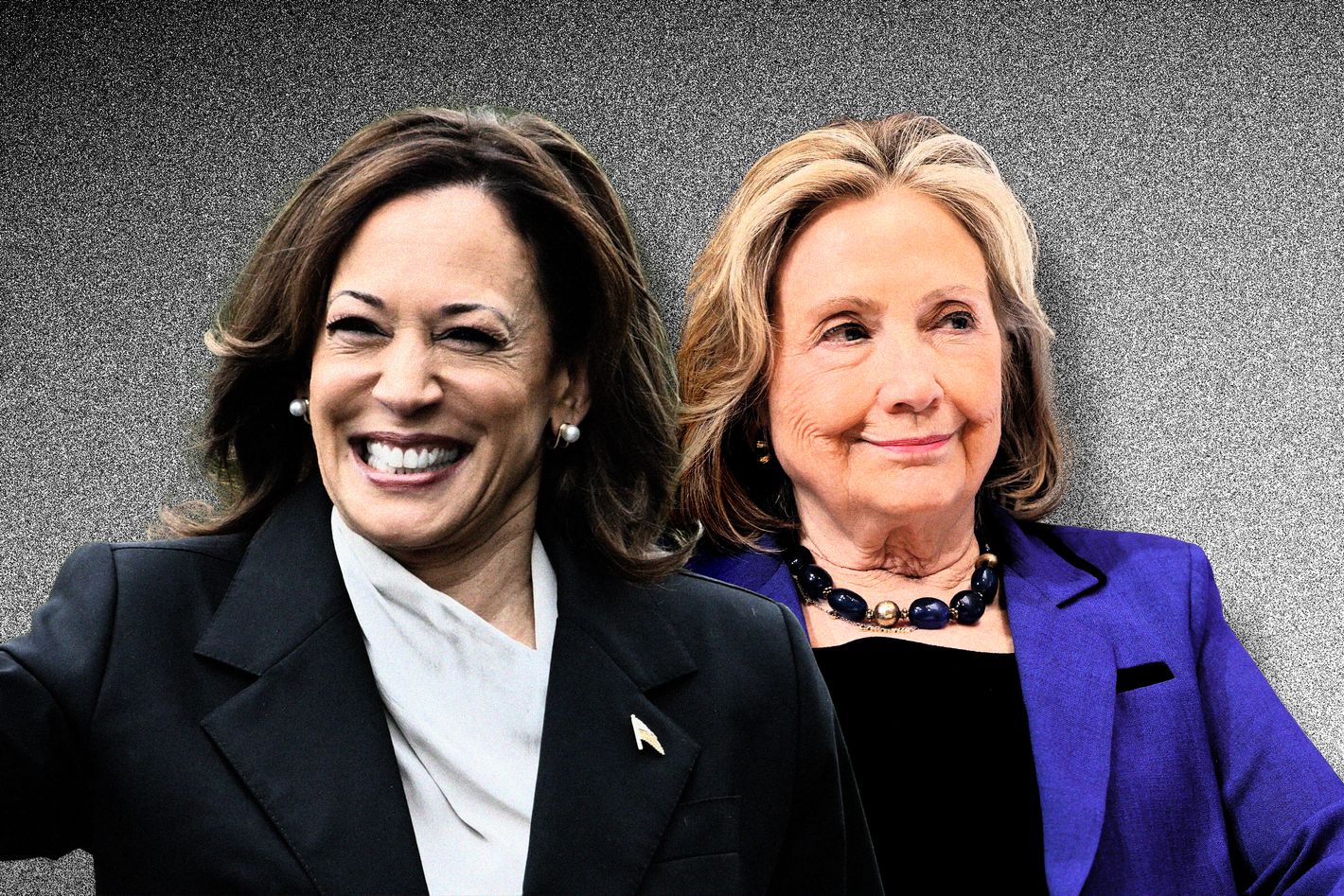A Woman Can Win
Kamala Harris could succeed where Hillary Clinton failed.

Vice-President Kamala Harris wasn’t even the presumptive Democratic presidential nominee when the bigotry began. Far-right pundit Matt Walsh tweeted that she got her start in politics by “sleeping with Willie Brown,” then the state’s assembly Speaker. Megyn Kelly agreed. Others recycle the racist claim that Harris is not a U.S. citizen, based on a 2020 piece by John Eastman, a senior fellow at the Claremont Institute who helped orchestrate Donald Trump’s attempt to overturn the election. Elsewhere, conservative operative Will Chamberlain — who worked for Governor Ron DeSantis’s presidential campaign — tweeted that Harris should not be president because she has “no children.” (Harris has stepchildren, which he said doesn’t count.) “Kamala Harris is the same woman who had to drop out pre-Iowa four years ago … She’s a mediocre, awkward, intensely dislikable politician …,” Chamberlain added. “Hillary 2.0.”
That comparison to Clinton might spook some liberals, though it shouldn’t. Harris struggled badly four years ago, but circumstances have changed since 2016 when Clinton lost to Trump. Like her, Harris will have to contend with misogyny. Otherwise, the two candidates have little in common, so their shared gender is not a reason to think that Harris is doomed. A woman can defeat Trump with the right vision and the right campaign. There’s hope for Harris, as long as she avoids certain pitfalls.
Clinton has aired her own theories for her loss in a book and countless interviews, and they’re key to understanding why Harris is a different candidate. In her telling, Clinton lost principally because of misogyny and Bernie Sanders and James Comey and even women voters, who abandoned her because she was not “perfect.” That has implications for Harris, who will face some of the same issues and worse, as a woman of color.
Clinton did face sexist headwinds and had for decades by the time she launched her campaign in 2015. The right had spent years poisoning her image as a far-left witch, with great success. The Comey letter did not help her, either. But her awkward relationship with the press may have prevented her from making a better case for herself to the public and she ran a deeply flawed campaign. She didn’t visit the key state of Wisconsin after losing it to Sanders in the primary, eventually losing it again to Trump. After the election, Politico reported that campaign staff had largely failed to heed warning signs in Michigan, a state Trump also won. “When you don’t reach out to community folk and reach out to precinct campaigns and district organizations that know where the votes are, then you’re going to have problems,” Virgie Rollins, the chair emeritus of the Michigan Democratic Women’s Caucus, told Politico. Clinton also leaned on a superficial identity politics that arguably emphasized the historic nature of her candidacy above other material concerns. The problem wasn’t that she mentioned women’s issues or appealed to other underrepresented groups on the campaign trail, but her celebrity-driven, pop-culture version of feminism lacked substance and generally took women voters for granted.
In a cruel twist, Trump’s white identity politics overwhelmed Clinton’s strategies. Now the right’s hysterical reaction to Harris offers a preview of attacks to come, both from Trump allies and from his campaign. J.D. Vance has repeatedly accused Harris of collecting “a government check” for years, which invokes the racist stereotype of the welfare queen, and has attacked her for being “childless.” For that and for many other reasons, Harris will have to work harder than even Clinton did if she’s going to defeat Trump this year.
She will also have to overcome her own flaws in order to win. She can be an enigma, at least to voters outside California. During her 2020 primary campaign, she never found a viable ideological lane and quit before Iowa. She didn’t carve out much of a public identity during her years as Biden’s vice-president, though the blame for that likely falls in part on the president himself. Because people don’t really know who she is, she’ll need to engage the press in order to introduce herself to the public. She also needs to distance herself from Biden’s Israel policy, which supports an ongoing genocide in Gaza and has cost the president critical support in Michigan with a large Arab and Muslim population. Much will depend on her choice of vice-president, and on the way she addresses the racism and misogyny that’s already come her way. She can’t ignore it, but there’s a way to wrap identity politics into a substantive and affirmative vision for the country.
There’s reason to think Americans will be receptive to such a vision, and to Harris. Clinton herself agreed in a column for the New York Times, writing, “It is a trap to believe that progress is impossible.” We’ve had four years of Donald Trump as president; we know who he is, and how he will govern. He’s much older than Harris, and he is even less coherent than he was in 2016 and 2020. He is unpopular with most Americans, thanks partly to his role in overturning Roe v. Wade, and his choice of Vance as running mate looks more and more like a strategic error. Beyond Trump, women like Governor Gretchen Whitmer of Michigan have been successful even in battleground states, and they help chart a path forward for the party. Women can win, and so can Harris.
Related
